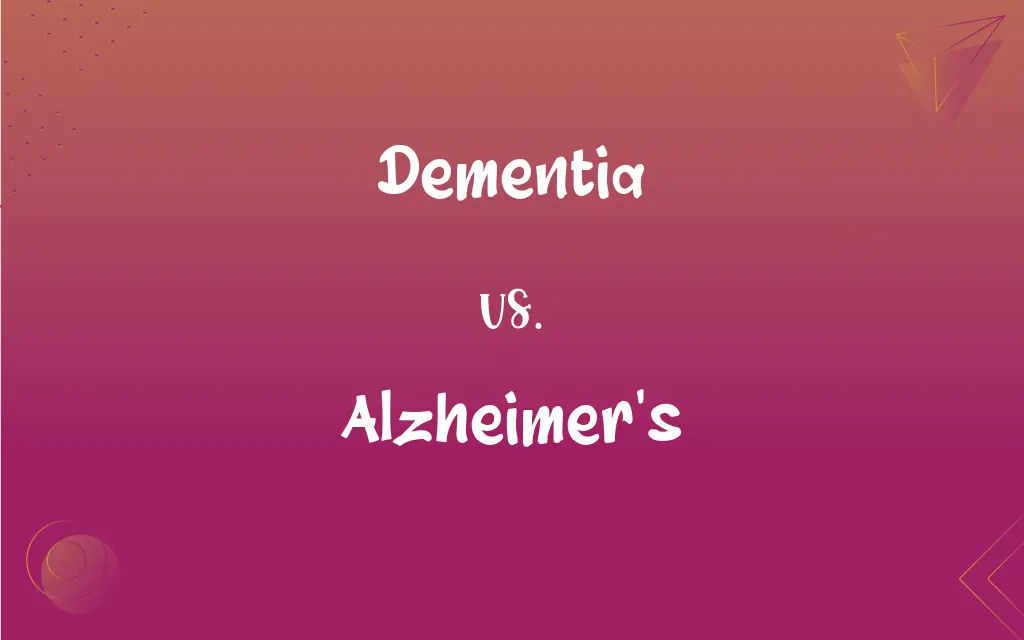Dementia vs. Alzheimer’s: What's the Difference?
Edited by Aimie Carlson || By Janet White || Published on August 10, 2024
Dementia is a broad term for cognitive decline, encompassing various conditions including Alzheimer's, which is the most common cause of dementia, characterized by memory loss and cognitive impairment.

Key Differences
Dementia is an umbrella term for a range of cognitive impairments, affecting memory, thinking, and social abilities. Alzheimer's is a specific disease under this umbrella, characterized by progressive memory loss and cognitive decline.
Dementia can result from various causes, not limited to Alzheimer's, and can affect individuals differently. Alzheimer’s is the most common cause of dementia, accounting for 60-80% of cases, typically appearing in individuals over 65.
Symptoms of dementia vary but generally include memory loss, difficulty in thinking, problem-solving, and language challenges. Alzheimer’s starts with mild memory loss, eventually leading to significant impairment in cognitive and daily functioning.
Dementia can be caused by Alzheimer's disease, vascular issues, Lewy body dementia, and more. Alzheimer's is believed to result from abnormal brain protein deposits, although the exact cause is still researched.
There's no cure for dementia, treatments focus on symptom management and improving quality of life. Alzheimer's treatments include medications for memory loss and therapies to manage behavioral changes.
ADVERTISEMENT
Comparison Chart
Definition
A broad category of brain diseases
A specific type of dementia
Prevalence
Includes various forms
Most common cause of dementia
Symptoms
Memory, communication, focus issues
Memory loss, disorientation, changes in personality
Causes
Alzheimer’s, vascular, more
Abnormal brain protein deposits
Treatment and Management
Symptomatic, varies by type
Medications, therapies for symptoms
ADVERTISEMENT
Dementia and Alzheimer's Definitions
Dementia
A decline in cognitive function affecting memory and reasoning.
Her grandmother's dementia made it difficult for her to recognize familiar faces.
Alzheimer's
A neurodegenerative disease characterized by a decline in cognitive skills.
Alzheimer’s disease often starts with simple forgetfulness.
Dementia
A syndrome usually of a chronic nature, caused by various brain illnesses.
Dementia is not a specific disease, but a group of conditions characterized by impairment of brain function.
Alzheimer's
A progressive disease that destroys memory and other important mental functions.
Alzheimer’s disease gradually eroded his ability to recall even the most familiar faces.
Dementia
A general term for loss of memory, language, problem-solving, and other thinking abilities.
Dementia can make everyday tasks challenging for those affected.
Alzheimer's
The most common cause of dementia, particularly in older adults.
Alzheimer’s is a major public health challenge due to its increasing prevalence in an aging population.
Dementia
A collection of symptoms that can include memory loss, difficulties with thinking, and judgment.
The first signs of dementia may be subtle and often involve memory issues.
Alzheimer's
A brain disorder that slowly affects memory and thinking skills.
Alzheimer’s disease made it hard for her to keep track of time and dates.
Dementia
A condition affecting elderly individuals, leading to a decrease in cognitive abilities.
Dementia often requires comprehensive care and support for the affected individual.
Alzheimer's
A condition leading to the deterioration of cognitive functions, impacting daily life.
The impact of Alzheimer’s extends beyond the patient, significantly affecting family and caregivers.
Dementia
Loss of cognitive abilities, including memory, concentration, communication, planning, and abstract thinking, resulting from brain injury or from a disease such as Alzheimer's disease or Parkinson's disease. It is sometimes accompanied by emotional disturbance and personality changes.
Alzheimer's
A progressive form of presenile dementia that is similar to senile dementia except that it usually starts in the 40s or 50s; first symptoms are impaired memory which is followed by impaired thought and speech and finally complete helplessness
Dementia
(pathology) A progressive decline in cognitive function due to damage or disease in the brain beyond what might be expected from normal aging. Areas particularly affected include memory, attention, judgement, language and problem solving.
Dementia
Madness or insanity.
Dementia
Insanity; madness; esp. that form which consists in weakness or total loss of thought and reason; mental imbecility; idiocy.
Dementia
Mental deterioration of organic or functional origin
FAQs
Is Alzheimer’s disease hereditary?
Genetics can play a role, but not all cases are hereditary.
What is dementia?
A broad term for brain conditions affecting memory, thinking, and social abilities.
Can dementia be caused by factors other than Alzheimer’s?
Yes, including vascular dementia, Lewy body dementia, and more.
How is Alzheimer’s related to dementia?
Alzheimer’s is the most common cause of dementia, characterized by progressive memory loss.
What are early signs of dementia?
Memory loss, difficulty in problem-solving, and changes in mood or behavior.
Is there a specific test for Alzheimer’s?
Diagnosis is primarily clinical; however, imaging tests can support it.
At what age does Alzheimer’s typically manifest?
Most commonly after age 65, though early-onset can occur.
Can dementia be cured?
Currently, there is no cure, but treatments can help manage symptoms.
Is memory loss always indicative of dementia?
Not always; other factors can cause memory loss.
Can lifestyle changes prevent dementia?
Healthy lifestyle choices can reduce the risk but not entirely prevent it.
How do symptoms of dementia and Alzheimer’s differ?
Alzheimer’s symptoms are a subset of dementia symptoms, primarily involving memory.
What are the stages of Alzheimer’s disease?
Early, middle, and late stages, each with progressively severe symptoms.
What supports are available for dementia patients?
Medications, therapy, and caregiver support are crucial.
What role does genetics play in Alzheimer’s?
Certain genes increase the risk but don't guarantee the disease.
What research is being done on Alzheimer’s?
Ongoing research focuses on understanding causes and developing treatments.
How is Alzheimer’s diagnosed?
Through medical history, physical exams, and neurological tests.
How fast does Alzheimer’s progress?
The progression can vary greatly among individuals.
Is dementia more common in certain age groups?
Yes, it's more common in older adults but can occur at any age.
Are there different types of dementia?
Yes, including Alzheimer’s, vascular dementia, and others.
Can Alzheimer’s be slowed down?
Early intervention can help manage the progression.
About Author
Written by
Janet WhiteJanet White has been an esteemed writer and blogger for Difference Wiki. Holding a Master's degree in Science and Medical Journalism from the prestigious Boston University, she has consistently demonstrated her expertise and passion for her field. When she's not immersed in her work, Janet relishes her time exercising, delving into a good book, and cherishing moments with friends and family.
Edited by
Aimie CarlsonAimie Carlson, holding a master's degree in English literature, is a fervent English language enthusiast. She lends her writing talents to Difference Wiki, a prominent website that specializes in comparisons, offering readers insightful analyses that both captivate and inform.






































































